Anera’s Water and Sanitation Work in Gaza
Posted in: About Anera, Programs
As I write this, Gaza is under quarantine. The number of COVID-19 cases is soaring. The unthinkable has happened: things have gotten even worse here than they had been. On top of crushing unemployment, isolation, poverty and the struggle to survive and provide, now families are falling prey to this terrible disease.
I am an engineer with Anera working on water and sanitation projects in Gaza. There is tremendous need in this sector in Gaza. Most tap water is unfit for human consumption. You’ve maybe heard the stats: 97% of water from Gaza’s aquifer does not meet the quality standards of the World Health Organization. The UN even said that, by 2020, Gaza would be uninhabitable.
Well, we still live here and we do our best with what we have. I’m glad to be working on innovative projects that make a real difference for families who have very little.
Our major funding for water and sanitation (WASH) comes from Islamic Relief USA (IRUSA). With their support, our team here has implemented 50+ WASH projects across Gaza. Our six years of IRUSA-funded work has followed a two-pronged approach:
- improving water infrastructure and
- spreading awareness of practical hygiene practices.
We recently compiled a map to illustrate just how many communities we have reached with our IRUSA WASH work.
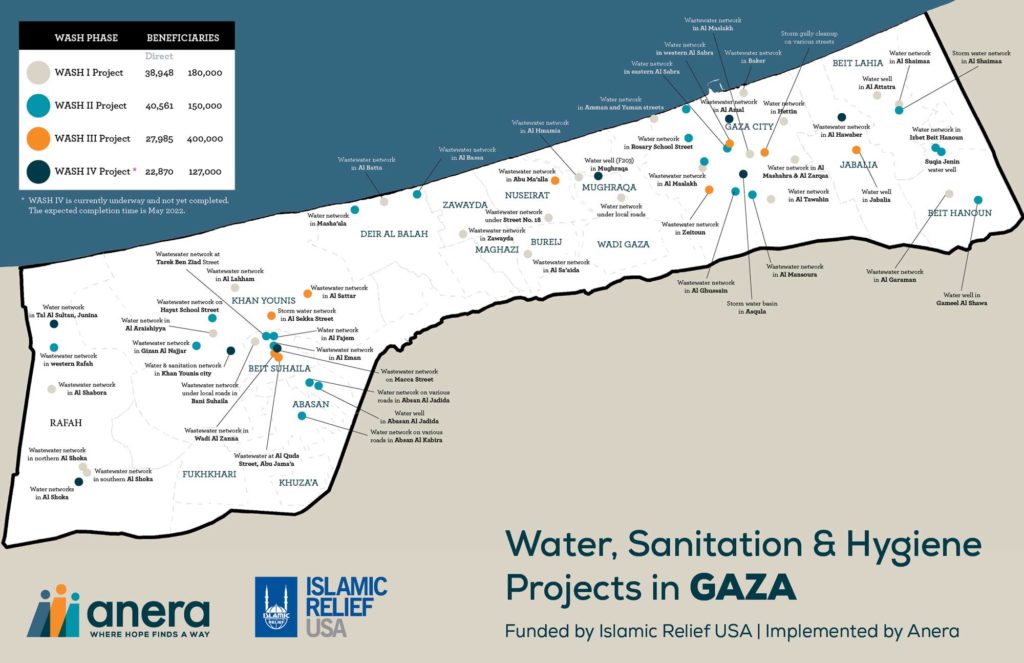

Wastewater Networks
Gaza’s aquifer is polluted with sewage. Septic tanks collect waste at homes. Once filled, families have to pay to have the waste emptied into municipal tanks. But it costs money that many families can scarcely afford, and trucks are not always available to pick up the waste. Sewage then builds up and overflows.
In southern Gaza, the situation is particularly bad, with some 25% of homes not connected to sewage systems of any sort. And where does that sewage go? Into the streets, the ground and the sea.
We install underground tunnel systems for transporting sewage away from houses, removing waste from homes and pumping it to treatment facilities for treatment.
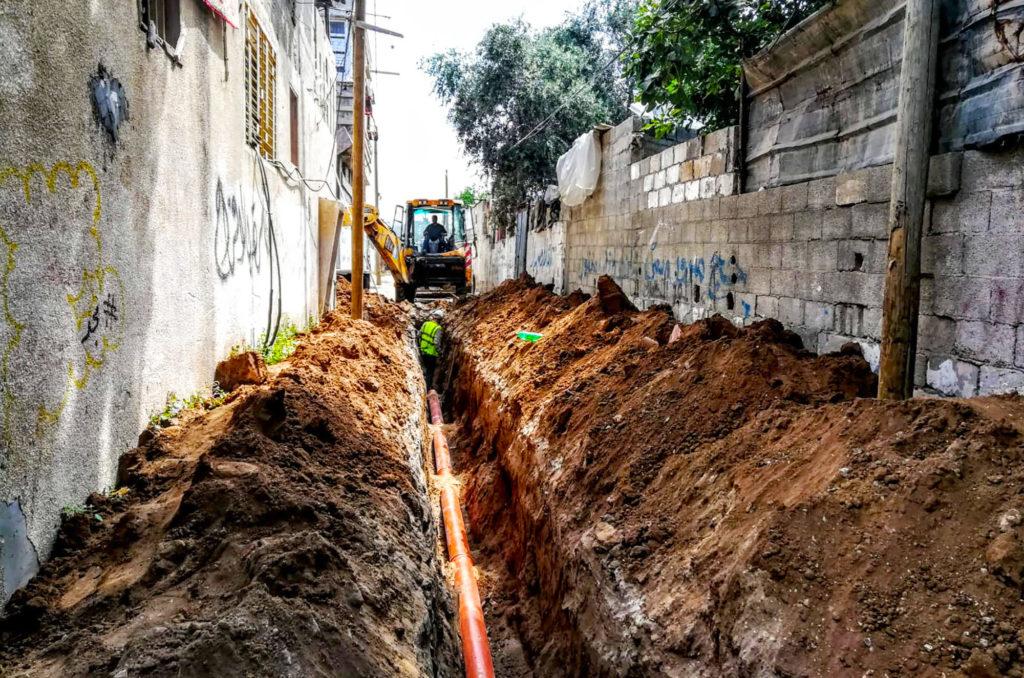

Read the story.
Water Wells
For many communities in Gaza, municipal wells are their main source of water. They are dotted all over the Strip. Most were built in the 1970s or 1980s and are now deteriorated and very inefficient in pumping water.
We have repaired six wells, with IRUSA funds, that serve densely populated areas. In each of our well projects, we installed new pumping facilities that vastly improved water pressure in people’s homes. We now also include reverse osmosis water purifiers and solar panels which each rehabilitation, to ensure that the water is potable and the whole system is sustainable and able to function despite frequent power cuts.
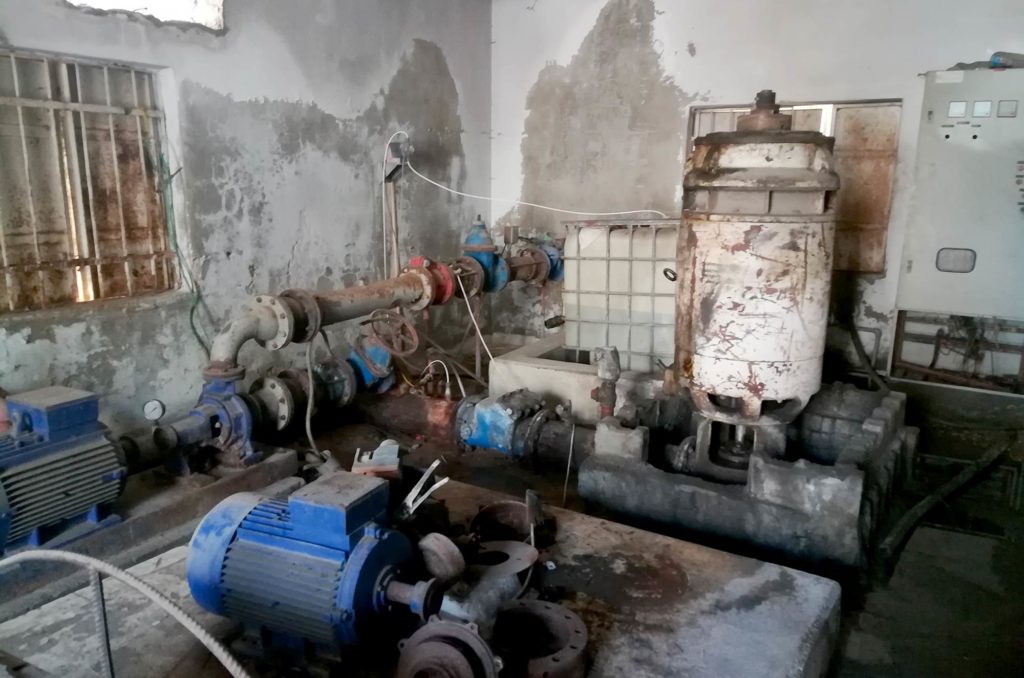
Jabalia refugee camp: The decrepit water well pump was underground and frequently flooded following heavy rains. 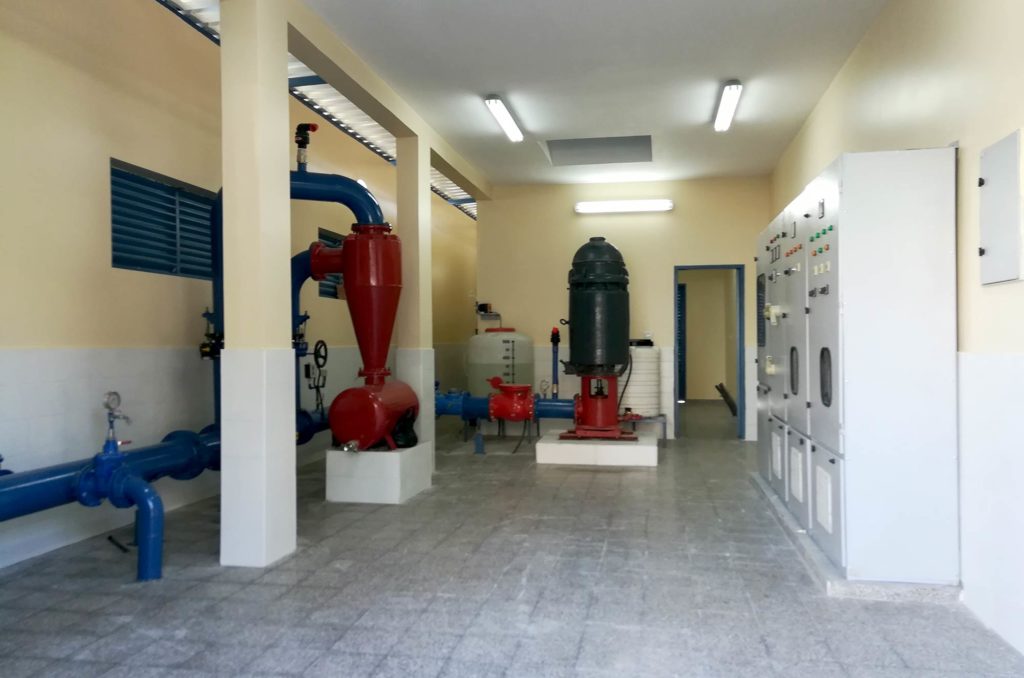
Jabalia refugee camp: The new pumping facility places equipment above flood level and improves efficiency.
Water Networks
Water loss from dilapidated pipes is a big problem in Gaza, where water is an extra precious resource. Many of the pipelines have far exceeded their useful lifetimes. Often the pipes that are undersized and can’t handle the demands of an ever-growing population. Most families have to buy their water and it is a significant financial burden on them. To make matters worse, the purchased water is unregulated and often of dubious quality.
When we fix water networks we replace steel pipes with PVC and extend networks to new homes that aren’t yet connected. To combat bacteria, we install chlorine units to clean the water in addition to installing reverse osmosis (RO) purifiers, which are a new addition to our projects. The RO systems significantly reduce salts and organic matter in the water, cleaning it to meet WHO standards. After installation, we run tests to verify that the piped water in people’s homes is testing negative for illness-causing coliform bacteria.
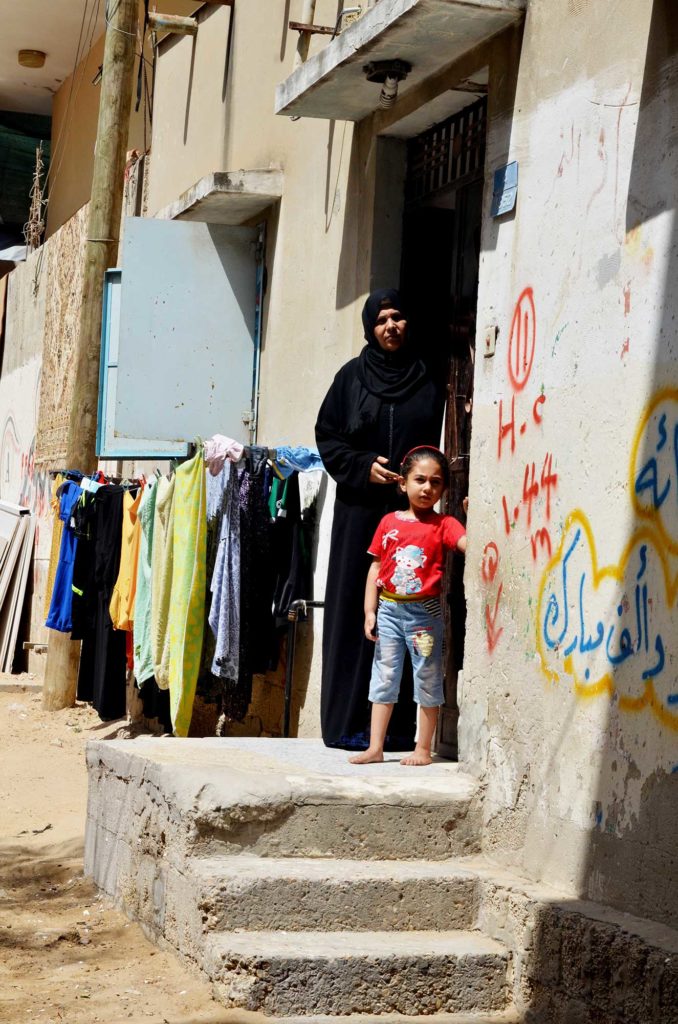

Learn how Anera’s new water network changed things for her family.
Storm Water Drainage Systems
As Gaza’s population has grown and become more urban, many agricultural areas have been converted to residences to meet the demand for housing. Storm water systems, however, have not been built at the same pace and, with fewer farmlands to absorb the water, flooding has become a major problem for everyone, from children trying to go to school to small businesses that rely on foot traffic. Large standing pools of water make roadways and sidewalks all but impassible. It can get pretty miserable here in the rainy season – right now!
The concrete culverts, manholes, and storm water gullies we install safely carry rainwater away from streets, homes and businesses to basins that store the runoff and replenish the aquifer.
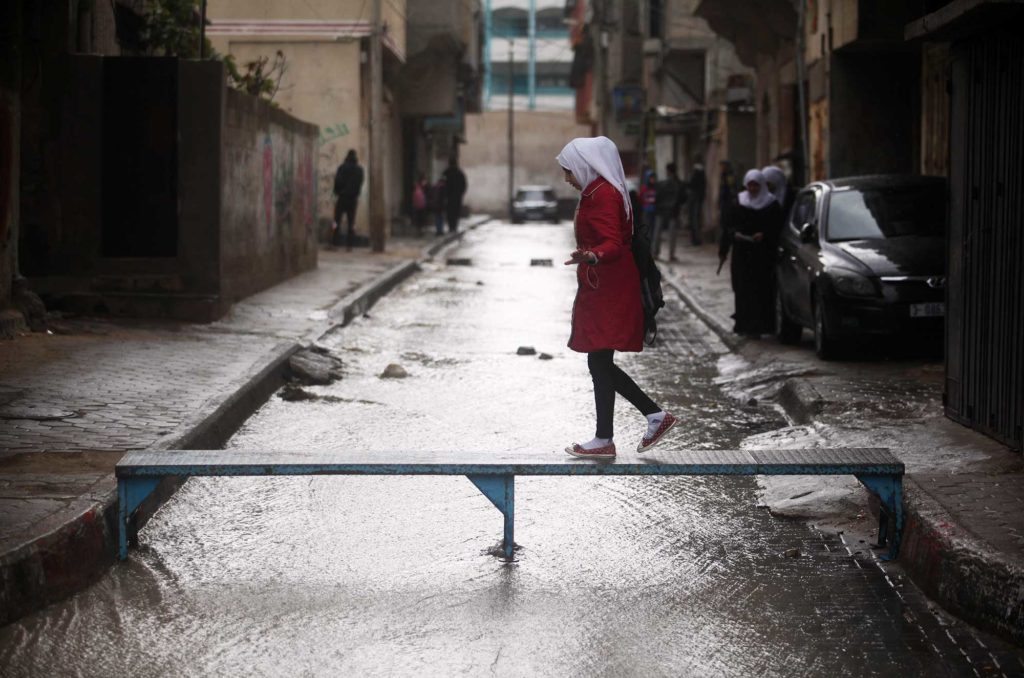

Hygiene Awareness Sessions
With every infrastructure project comes public awareness sessions for the residents of the impacted area. We talk about waterborne illnesses – how to spot the symptoms and the best ways to treat illnesses once contracted, at home or under a doctor’s care.
Because water in Gaza is of such poor quality, it’s critical that we cover in our sessions issues like personal hygiene practices – hand-washing, for instance – and household-level cleaning habits and food prep. We also discuss the problems that can arise from improperly disposing of waste, including why it is harmful to dump it down stormwater networks (and also illegal).
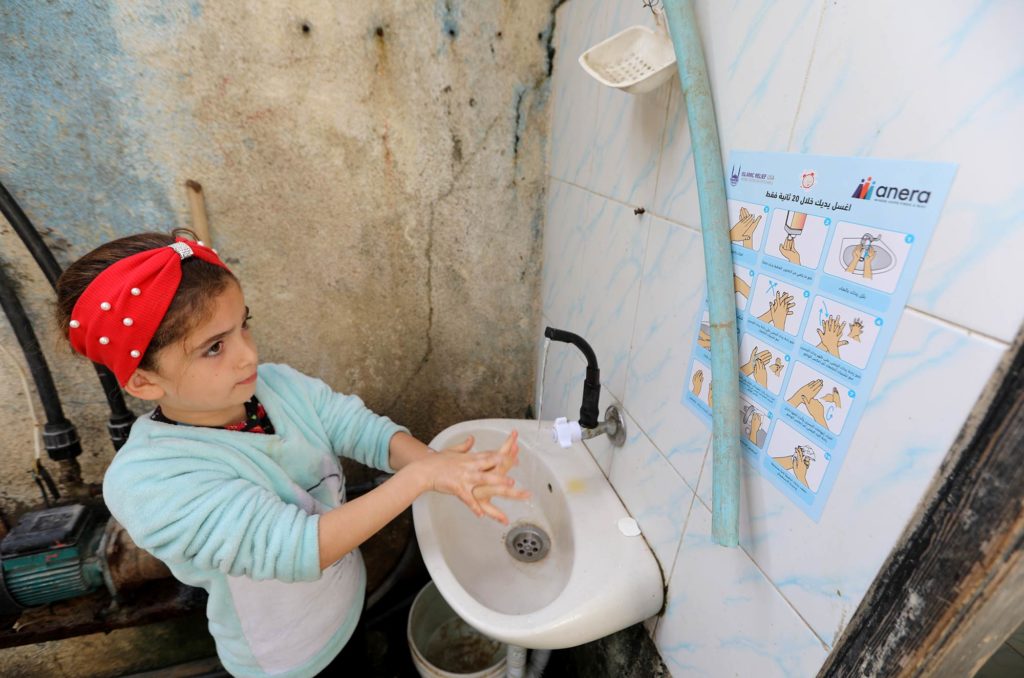

Impact of WASH Work in Gaza
The WASH work we are doing in Gaza is making a big difference in people’s lives. Thanks to IRUSA, since 2015, Anera’s water and sanitation programs in Gaza are directly serving 44% of Gazans through wells and wastewater network improvements and community education. By June 2022, this project will have improved the lives of 50% of Gaza!
While those numbers are incredibly impressive and gratifying, the most powerful thing for me is when children come up to me and thank Anera for making it easier for them to get to school in the winter, because they don’t have to navigate flooded streets to do so. Mothers have told me that the water we connected to their homes was a luxury they never knew before. Business owners have shaken my hand, expressing gratitude for the fact that sewage no longer infects their streets and fills the air with a stench.
It means the world to me to be able to help my community with these important projects. Gaza is still livable, but only because of the work that organizations like Anera do. Let’s keep these great projects going!
The views expressed herein are those of Anera and shall not, in any way whatsoever, be construed to reflect the official opinion of IRUSA, its Islamic Relief affiliates, or its donors.
OUR BLOG
Related
In this log, Anera provides updates on unfolding war in Palestine and our response. In some cases, additional activities may be added retroactively to the daily entries as we receive additional program reporting. Questions? See our FAQ page July 6,…
